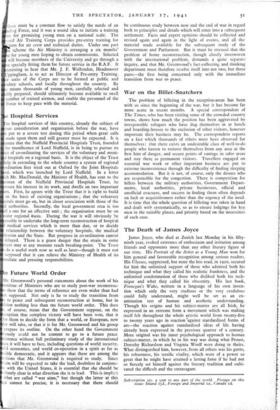The Death of James Joyce
James Joyce, who died at Zurich last Monday in his fifty- ninth year, evoked extremes of enthusiasm and irritation among friends and opponents more than any other literary figure of our time. His Portrait of the Artist as a Young Man won for him general and favourable recognition among serious readers. His Ulysses, suppressed, but none the less read, in 1920, secured for him the unlimited support of those who admired both his technique and what they called his realistic frankness, and the unlimited condemnation of those who disliked both his tech- nique and what they called his obscenity. His last book, Finnegan's Wake, written in a language of his own inven- tion which only the very studious or the very credulous could fully understand, might well be set as an ex- amination test of human and aesthetic understanding. Though his origins and his subject-matter are all Irish, he expressed in an extreme form a movement which was making itself felt throughout the whole artistic world from twenty-five to twenty years ago in reaction 'against standardised forms of art—the reaction against standardised ideas of life having already been expressed in the previous quarter of a century. More original was his inner psychological approach to human subject-matter, in which he in his way was doing what Proust, Dorothy Richardson and Virginia Woolf were doing in theirs. What distinguished him, however, from all others was his gusto, his robustness, his terrific vitality, which were of a power so great that he might have attained a lasting fame if he had not so fiercely set himself against the literary tradition and culti- vated the difficult and the extravagant.






























 Previous page
Previous page